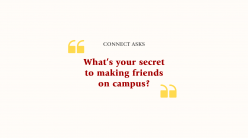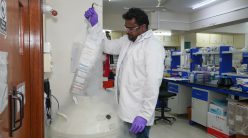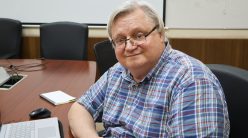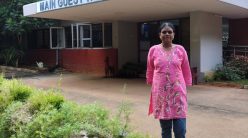CONNECT spent a day with Francis Jayakanth whose work illustrates why information science is important to institutional libraries
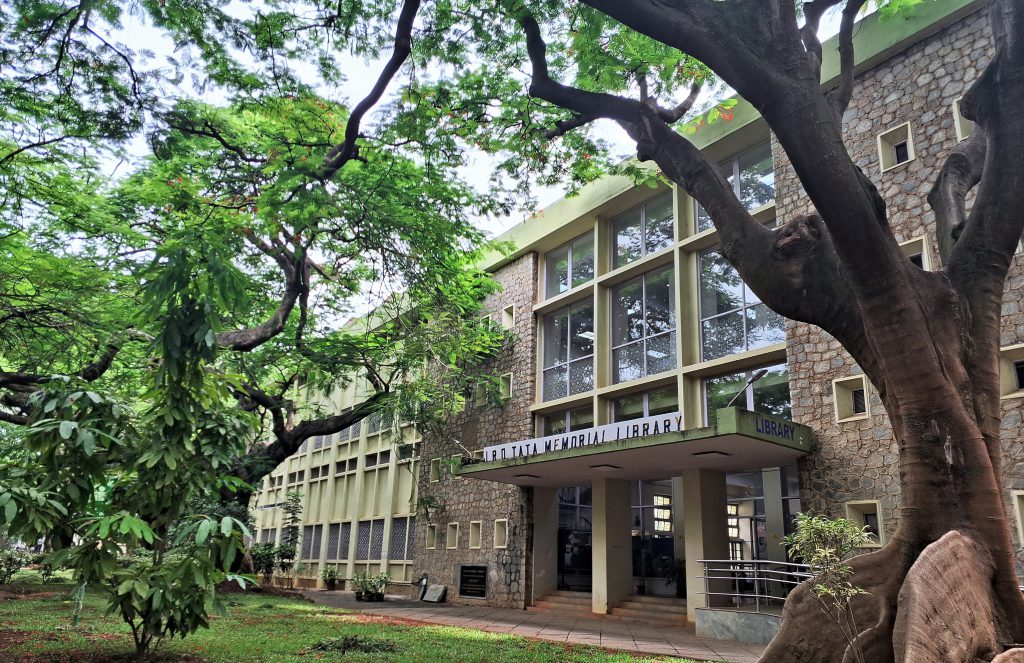
Despite the overcast mid-July sky, the campus of IISc wears an inviting look. It has been bathed in recurring showers, courtesy the monsoon which by now is in fine fettle. Down the main gate of the Institute, along the Gulmohar Marg, stands a large but understated building from the early 1960s, housing the JRD Tata Memorial Library. In the south wing of the first floor, a conference room doubles as the office of Francis Jayakanth, as he awaits the renovation of what will be his more permanent office. The makeshift office has computers, filing cabinets and old-school steel Godrej almirahs holding neatly arranged books, files, and other official documents.
At the centre of the room is a large, oval table with several office chairs around it, many still protected by the plastic wrap in which they came. Francis’ workstation – closer to the window on the right side of the room – comprises a desk, a computer, an office chair, and a printer. The room, although crowded, does not feel cluttered because of the high ceiling and four large windows. The windows offer an impressive view: Snaking brown branches of Gulmohar trees are interspersed with their characteristic vibrant green compound leaves; and perched precariously on these leaves are the blazing orange-red petals of the flowers that were ripped out by the overnight storm.

Francis, wearing shades, arrives at the library at 9.15 am and immediately scurries up to his office upstairs. The 62-year-old Scientific Officer is dressed in a neatly pressed powder blue full-sleeved shirt and black trousers. A pair of brown shoes and a brown leather belt complete his attire. He replaces his shades with regular glasses, tidies up his office, and puts away the teacups and saucers from the previous evening.
Francis sits at his desk and opens his mailbox to check emails that may require urgent attention. “For instance, someone may have asked for credentials to login to Turnitin [plagiarism detector software]. Or quite often, students ask for initial registration links for various academic databases that IISc subscribes to.”
“No such emergency emails today,” he says, satisfied.
The next order of business which Francis attends to, at 9.35 am, is to check the library servers that are on the cloud. “Last night, one of the servers, which we manage with SERC [Supercomputer Education and Research Centre] – on which the electronic thesis and dissertation repository runs – was down. So, I wrote to DIGITS [IT support at IISc] and Mr Filbert Minj from SERC. There was a technical issue, and he has fixed it.”
Francis continues with his emails, occasionally taking a sip of hot water from his aquamarine thermos. About 20 minutes later, he gets up from his chair. “I can’t sit for long periods.” As he stands up, as if by magic, the desk starts rising too – it is one of those standing desks whose height is adjustable.
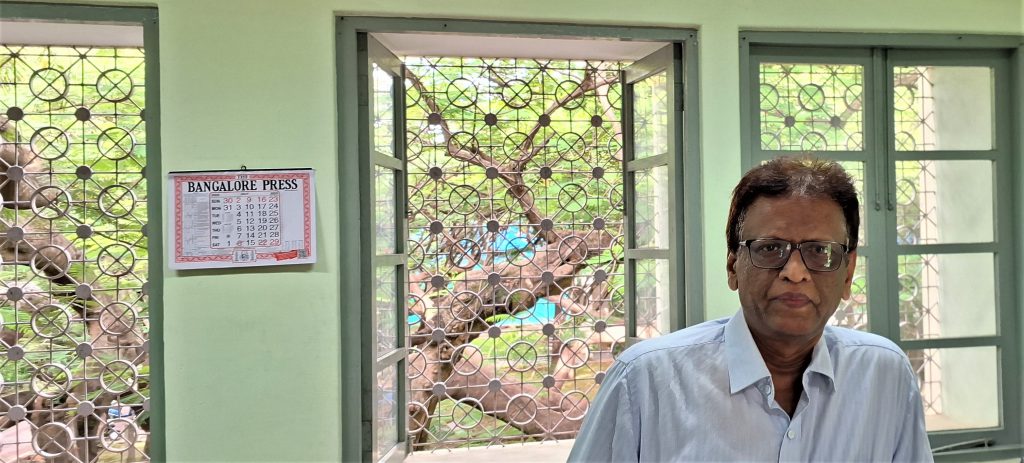
At 10 am, Francis receives a request from the Chair of a department at IISc. The Chair has suggested that the library subscribe to a few additional journals and has asked whether IISc can have a read-and-publish agreement with the publisher of some of these journals. The agreement would ensure that the subscription will include the article processing charge (APC), a fee that is often charged by a journal to authors publishing in it. The APC for a journal can be quite high, ranging anywhere from $600 to $11,000 per paper, Francis says. So, in the last few years, IISc’s library has been entering into such read-and-publish agreements with journal publishers, if it is cost-effective for IISc. “For example, in 2021, we entered into such an agreement with Cambridge University Press [CUP]. The cost difference was not much, but in the process, we also got access to more journals. Previously, we used to pay around £7,000-8,000 for seven or so titles. Now we pay £14,000 and get access to all the science journals of CUP – more than 130 journals. Besides not having to pay APC, there is one more advantage. Once published, an article [by our authors] automatically becomes open access.” What Francis means when he says “open access” is that the article can be accessed by anybody reading online, free of cost.
Francis’ primary responsibility at the library is to manage subscriptions for academic journals and databases
Francis’ primary responsibility at the library is to manage subscriptions for academic journals and databases. “IISc’s library has about 65-70 subscriptions with journal publishers. Our present budget for online journals and databases is Rs 20.50 crore. Books and e-books are not included in this budget.”
Each year, at the start of the last quarter, the library receives renewal invoices from the publishers. Although there is room for negotiation, they typically hike the subscription cost by 4-6% annually. IISc’s faculty members also request access to new journals. So, the library has to prioritise its subscriptions. “What we do is to take the usage data for each journal from the first three quarters and determine what is called the cost per download for that journal. If this is high, then we write to the respective departments and seek their feedback. If they insist that we continue with the subscription, we go by their suggestion because they are the ones who know the value of the content.” Francis then creates a budget proposal with the information he has gleaned from the journals and the departments, and he presents it to the Institute’s Library Purchase Committee. “By December, we get the budgetary allocation, and the renewal process starts.”
But the arrangement with publishers is not without its challenges. “Sometimes, what happens is that we have visitors on campus, who are invited by faculty or students. When they see the journals they can access, they end up downloading too many articles. This is called systematic downloading. At times, even our own students do it if they are graduating and feel that they may not have access to these journals in the future.” In the event of a systematic download, access to the journal is cut off by the publisher. It is Francis’ job to convince them to restore access.
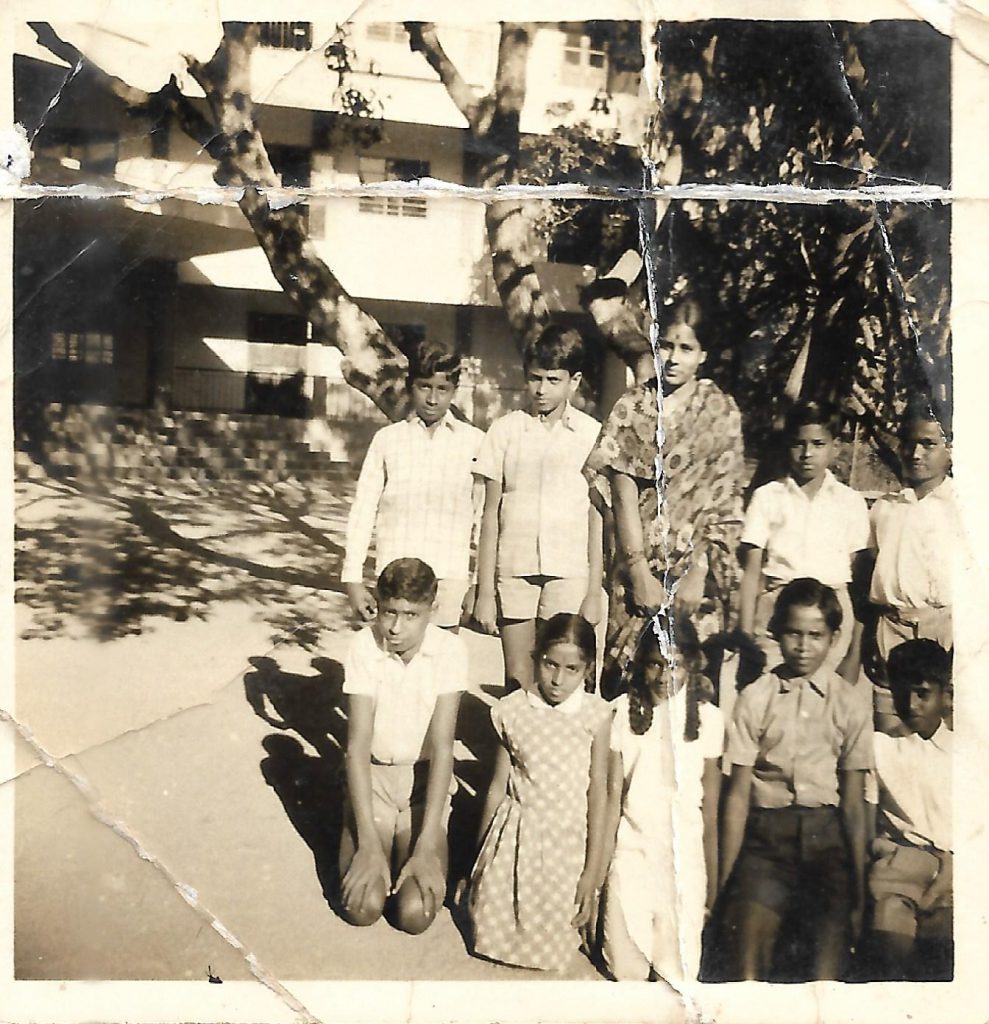
(Photo courtesy: Francis Jayakanth)
While subscriptions are important, having an easy-to-access library website for users is equally critical. And for this, the library needs a well-designed content management system, one that would help manage and retrieve huge amounts of data. The IISc library’s content management system was conceived and developed by Francis. “We use Drupal [a free, open-source software] for managing our content. I had experience in it. So, I started working with it in the background at home. Once it took some shape, I brought it here and we started configuring computers and adding content.”

At 10.15 am, Francis moves to his next task: Getting a document ready for an external audit of the subscription purchases, conducted annually by the office of the Comptroller and the Auditor General (CAG). The whirring sound of the printer suggests that the document is ready, which he decides to take by himself to the Finance and Accounts (F&A) section.
As he steps out of the library, Francis switches back to the dark glasses. “My eyes are sensitive to light. I used to live in Basaveshwara Nagar but because driving at night was becoming difficult, I moved back to campus,” he says.
Francis says he moved “back” to campus because this is where he grew up. He is the son of GD David, who served as Secretary to Satish Dhawan, IISc’s former Director. Francis’ favourite memories of growing up in IISc revolve around sports. “I used to be a sports enthusiast. I would go to TMC [Tata Memorial Club] to play carrom and table tennis. I would also play table tennis at the Faculty Club. We had a couple of grounds where I would play cricket,” he recalls.
Francis went to several schools, including Nirmala Rani Primary School in Malleswaram. He graduated from MES College, also in Malleswaram, majoring in Physics, Chemistry and Mathematics. His first job, which he started in 1982, was in the Department of Post and Telegraph. “I had a permanent position there, but somehow, I was not happy.” During this period, he became curious about computers and joined computer courses in FORTRAN and COBOL being offered at the Centre for Continuing Education and at the Department of Chemical Engineering at IISc.
In 1984, Francis learnt about a Project Assistant position that had opened up at IISc. The position required the candidate to work with the mainframe computer and have a knowledge of COBOL. “I applied and I got this job and took it up even though I had a permanent position.” He worked on the project until its completion in 1986. As it wound up, he came across another job opening in IISc, but this time it was for a permanent position at the National Centre for Science Information (NCSI) which had been established just a few years earlier. He applied for the advertised position and was hired.
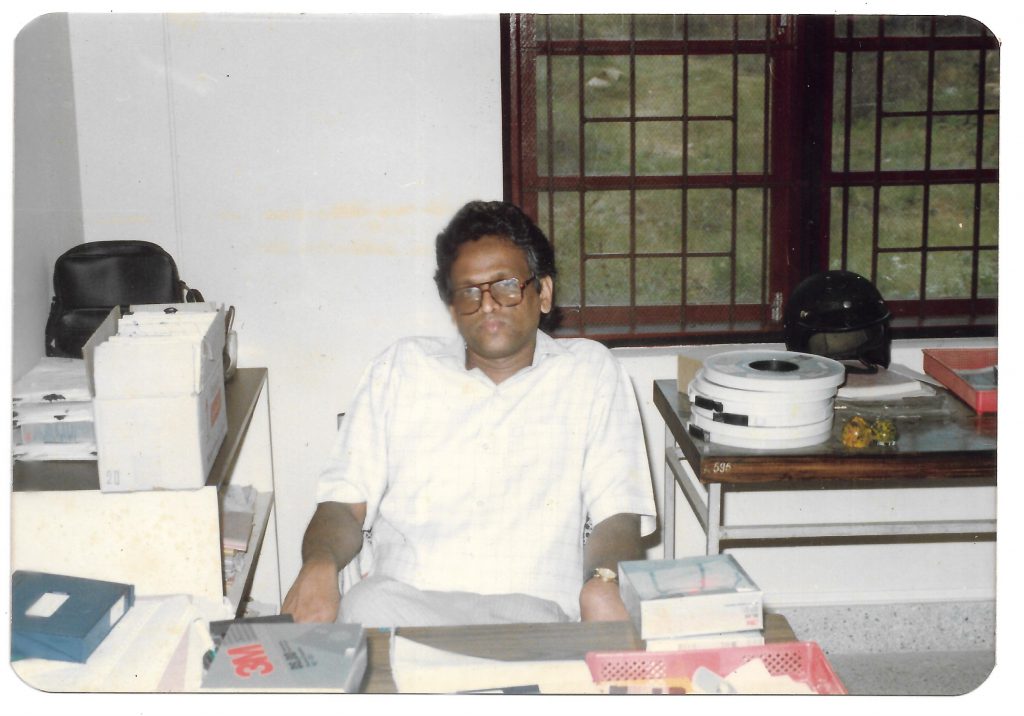
Francis, who ended up spending most of his working life at NCSI, spells out its mandate. “Our former librarian, TKS Iyengar, came up with the idea of the Centre. Its goal was to provide information services to researchers in all universities in India, in all STEM fields.” It would subscribe to leading databases of abstracts of research articles – which were then available electronically on magnetic tapes – and construct a profile for each registered researcher based on keywords they provided. NCSI built software, a separate one for each discipline, to match researchers with abstracts of articles that would be relevant to their research.
“Researchers could then approach the library for full-text versions of articles. NCSI would also subscribe to some leading journals. Apart from that, we had a tie-up with the British Library and the National Library of Australia for full texts of articles of some other journals. This was a very successful venture.”
During its heyday, the Centre also had a one-year training programme, which was eventually upgraded to an 18-month course. Its goal was to train newly minted library graduates on how to handle digital information services. “Over 150 students were trained as part of this programme and its alumni are well placed in academia, government and the corporate sector. In fact, our former Librarian, whom we unfortunately lost last year, Dr Anand Byrappa, was a product of this programme,” says Francis.
While he was at NCSI, Francis also did his PhD from Bangalore University in information sciences. “Luckily, I got a Fulbright Fellowship and went to the Old Dominion University in Virginia for six months.”
In 2012, IISc merged NCSI with the library. Not long after, Francis received a job offer from the Indian Institute of Management Bangalore for the position of Librarian. “I took up the job. But instead of resigning [from IISc], I joined them on lien. In terms of position and monetary benefits, it was much better than IISc.” But he missed the Institute. So, he came back a couple of years later to continue his work at IISc’s library.

By 11 am, Francis is done at F&A and heads to Nesara restaurant for a quick cup of coffee. He talks extensively about the changing nature of libraries and librarians, as well as what IISc’s library should do to adapt.
Francis is back in his office at 11.30 am. He attends to a work-related phone call and then checks for posts in LIS-Forum, an online discussion group for librarians and information professionals across India, that he has moderated for over 25 years. It comprises over 6,000 library professionals from across the country.
Francis has moderated LIS-Forum, an online discussion group for librarians and information professionals across India, for over 25 years
Like voluntarily moderating LIS-Forum, which is not part of his job description, Francis often goes beyond the call of duty. During the COVID-19 pandemic, not everyone from IISc could access online resources. “People were confined to their homes. Though IISc had in place mechanisms for them to access online resources remotely through VPN, there are people in the IISc community who do not automatically get a VPN connection – project assistants, postdocs, etc. Besides, there is a limit on the number of users the VPN server can deal with simultaneously. So, we had to come up with a solution quickly.”
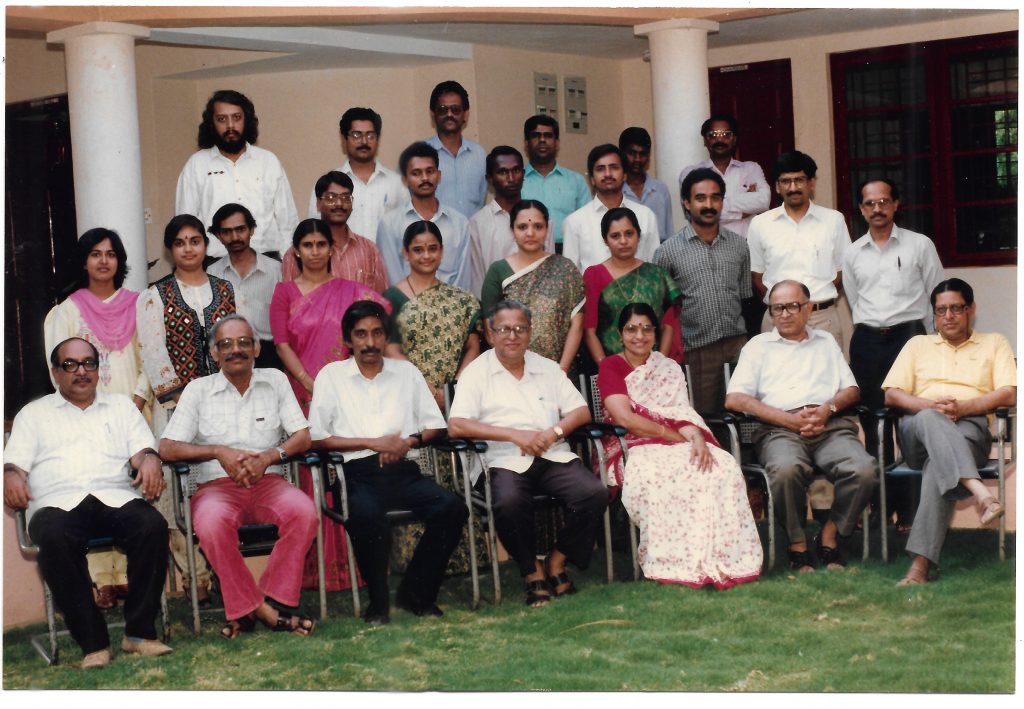
The solution involved an open-source software called Shibboleth, which Francis says is secure and time-tested. “In about two weeks, we were able to set up the server. Anyone with an official IISc email address could gain access to online resources.” The service, adds Francis, continues to be popular even after the pandemic.
Yet another project that Francis has been involved in is ePrints, an open-source repository of publications and pre-prints from IISc. It started in the late 1990s, when the open-access movement was gaining popularity. “We are still updating it on an almost daily basis. Today, we have over 62,000 IISc publications on this repository. It is not exhaustive, but I estimate that about 85% of all publications are part of this.” Francis, however, is disappointed that in the case of papers published in journals that IISc has no subscription to, he is only able to upload the final accepted version of papers, and not the publisher’s version. He feels that it is, therefore, important that IISc implements an open access policy, which will ensure that copies of all the accepted publications are given to the library.
Yet another project that Francis has been involved in is ePrints, an open-source repository of publications and pre-prints from IISc
Francis has also been involved in several training programmes outside IISc. “We have conducted many workshops to help other institutions do what we have been able to do, especially in our early days – for instance, setting up open-access institutional repositories and content management systems. We helped set up facilities in places like Bangalore University, National Aerospace Laboratories, Indian Academy of Sciences, National Institute of Advanced Studies, etc.”
In recent years, Francis has been associated with yet another information technology project. In 2017, the Institute decided to move its IT infrastructure, including servers, to the Microsoft Azure cloud platform. The library, at that point, oversaw five on-premises servers for services like ePrints and electronic theses and dissertations. Three of these servers were in the library and two in SERC. ”All of these had to be moved to the cloud platform,” says Francis, “which we did in six months in early 2018.”

Back in his office, Francis works standing at the desk in front of the computer, until he breaks for lunch at 1.15 pm. “I go home for lunch. Typically, it is proper South Indian food – sambar rice, pallya and curd rice,” he says.
Francis returns to work at 2.15 pm. “Afternoons are when I try to implement some new things at the IISc library. For example, now I’m trying to set up a repository for data management. We already have them for theses and dissertations and IISc’s publications, but we don’t have one for data [data generated during research].” He pauses and continues, “See, we have so many labs where students are generating data day in and day out. Once the end goal is achieved, what happens to the data?”
“So, we need a dedicated, centralised repository. I have already experimented with one open-source software. Now I am experimenting with a second, C-KAN [Comprehensive Knowledge Archived Network]. It’s a software which even the governments of India, Singapore, and Australia use.” Francis hopes to set up a prototype using sample data from a few labs and introduce it to the campus community so that it can become part of the library’s regular service.

At 2.30 pm, Francis joins a Zoom meeting to discuss C-KAN with members of the DST-Centre for Policy Research (DST-CPR) at IISc, with whom he is collaborating to conduct a workshop soon. Once the meeting is over, he points to the three computers on the right side of the room and says, “These systems are used for such projects. I have a trainee who comes regularly and helps with some of our routine work as well as this project.”
Francis is consumed by the C-KAN experiment for the rest of the afternoon, only to be interrupted by the arrival of a cup of tea, which he drinks sitting at the oval table.
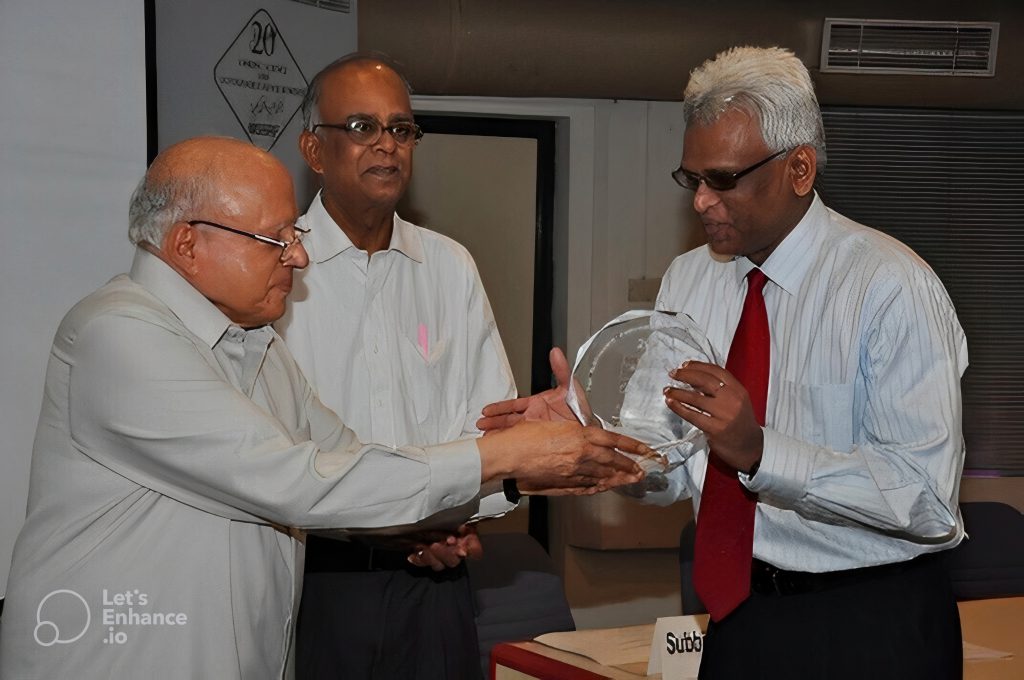
Francis uses this opportunity to reflect upon his journey at IISc, one that he describes as “enriching”. “My time here has been nothing short of transformative, shaping my professional and personal growth.” He is, in particular, grateful to the former Chairs, Coordinators, and his colleagues at NCSI. “Prof V Rajaraman, Prof N Balakrishnan, Prof S Ramashesha, Prof AG Menon, Prof NV Joshi, the late Dr TB Rajashekar and several others have guided and inspired me throughout my journey at the Institute.” In the same breath, he also mentions the name of one of India’s leading information scientists and currently a Visiting Scientist at DST-CPR, Subbiah Arunachalam, who has been Francis’ cheerleader for many years now.
After he finishes his tea, Francis continues to work on C-KAN until 5.30 pm when he packs up, puts on his shades, and leaves the library building, only to be back here the next morning at quarter past nine.
